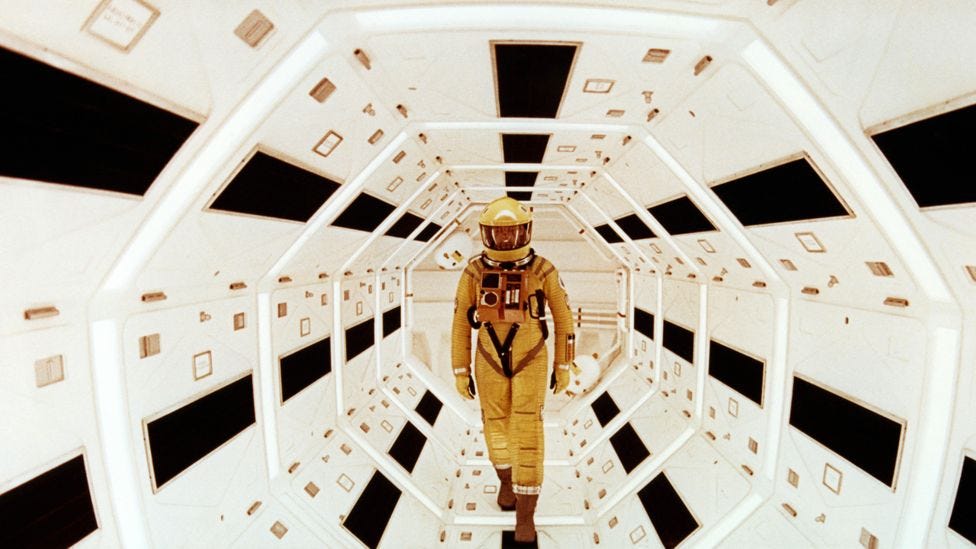Spring has arrived💐[HTC #59]
Welcome Back!
Welcome to Hold the Code #59, our first edition of the Spring quarter.
In this edition, we’ll hear from our writer Michael Crystal in his movie review of Stanley Kubrick’s 2001: A Space Odyssey. The science fiction film premiered in 1968 and raised questions about responsible technology still relevant today.
This quarter, we’ll be playing around with different article styles, and reader feedback is incredibly important. In fact, improving engagement with you all is our number one priority as the academic year wraps up. If you have any comments, questions, or anything else please fill out our feedback form. We value your voices and want to highlight them. We’re hoping to have more guest writers—if you want to write a contributing article, let us know in the form. Every two weeks, one respondent will be randomly selected to win a free drink of their choice from Happy Lemon!
Thank you for being part of our community. We hope you enjoy reading! Have a great week.
2001: Space Odyssey Movie Review
Michael Crystal
Kubrick’s film has had a profound impact on cinema, science fiction, and popular culture as a whole, and its influence is still felt today. I wanted to focus on one of the essential aspects of the film: its portrayal of technology and how it affects human society, both positively and negatively.
Time of Release
At the time of its release, the film's depiction of technology was groundbreaking. The film presents a future where space travel and artificial intelligence have become commonplace, and humans have built massive spaceships and stations capable of interstellar travel. The film was released at the height of the space race between the United States and the Soviet Union, and the technology depicted was the result of years of technological advancement in the field of space exploration.
One of the most significant connections between the state of technology when the film was made and the state of technology now is the role of artificial intelligence. In the film, HAL 9000 is an advanced AI system that controls the spacecraft and assists the human crew in their mission. At the time of the film's release, artificial intelligence was still in its infancy, and the concept of an AI system capable of controlling a spacecraft was purely science fiction.
Implications for Today
Today, artificial intelligence is much more advanced, and AI systems are used in a variety of applications, from self-driving cars to medical diagnoses. The film's portrayal of AI systems that can think and reason like humans remains a relevant and significant topic of discussion today, and the ethical considerations raised by the film regarding the use of AI in society are still relevant.
Another connection between the state of technology when the film was made and the state of technology now is the role of space travel. At the time of the film's release, the United States and the Soviet Union were locked in a space race, and the film's depiction of massive spacecraft and space stations capable of interstellar travel was a vision of what the future of space exploration might look like. Today, space travel has become a reality, with private companies like SpaceX and Blue Origin working to make space travel more accessible and affordable. The film's vision of space travel as a routine and mundane aspect of human life remains an aspiration for many, and the film's depiction of the beauty and wonder of space travel still resonates with audiences today.
What this means
However, despite the technological advancements made since the film's release, there are still many aspects of the film that remain relevant today. The film's exploration of the human relationship with technology and the dangers posed by technology's unchecked advancement remain relevant today.
The film's depiction of technology as a double-edged sword that can both help and harm humanity is still relevant today. As technology continues to advance at a rapid pace, the ethical considerations raised by the film regarding the use of technology in society are more relevant than ever.
In conclusion, 2001: A Space Odyssey is not just a visually stunning film about space exploration and the future of technology. It is a film about humanity's relationship with technology and how it shapes our world. Its vision of the future remains relevant today, and its exploration of the ethical considerations raised by technology's unchecked advancement is more critical than ever. It is a film that reminds us that while technology can be a powerful tool, it is up to us to use it responsibly and for the greater good.


